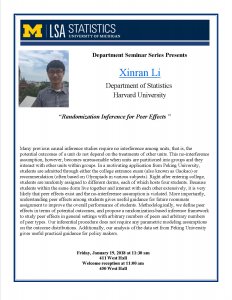Presented By: Department of Statistics
Statistics Department Seminar Series: Xinran Li, Department of Statistics, Harvard University.
Randomization Inference for Peer Effects

Many previous causal inference studies require no interference among units, that is, the potential outcomes of a unit do not depend on the treatments of other units. This no-interference assumption, however, becomes unreasonable when units are partitioned into groups and they interact with other units within groups. In a motivating application from Peking University, students are admitted through either the college entrance exam (also known as Gaokao) or recommendation (often based on Olympiads in various subjects). Right after entering college, students are randomly assigned to different dorms, each of which hosts four students. Because students within the same dorm live together and interact with each other extensively, it is very likely that peer effects exist and the no interference assumption is violated. More importantly, understanding peer effects among students gives useful guidance for future roommate assignment to improve the overall performance of students. Methodologically, we define peer effects in terms of potential outcomes, and propose a randomization-based inference framework to study peer effects in general settings with arbitrary numbers of peers and arbitrary numbers of peer types. Our inferential procedure does not require any parametric modeling assumptions on the outcome distributions. Additionally, our analysis of the data set from Peking University gives useful practical guidance for policy makers.